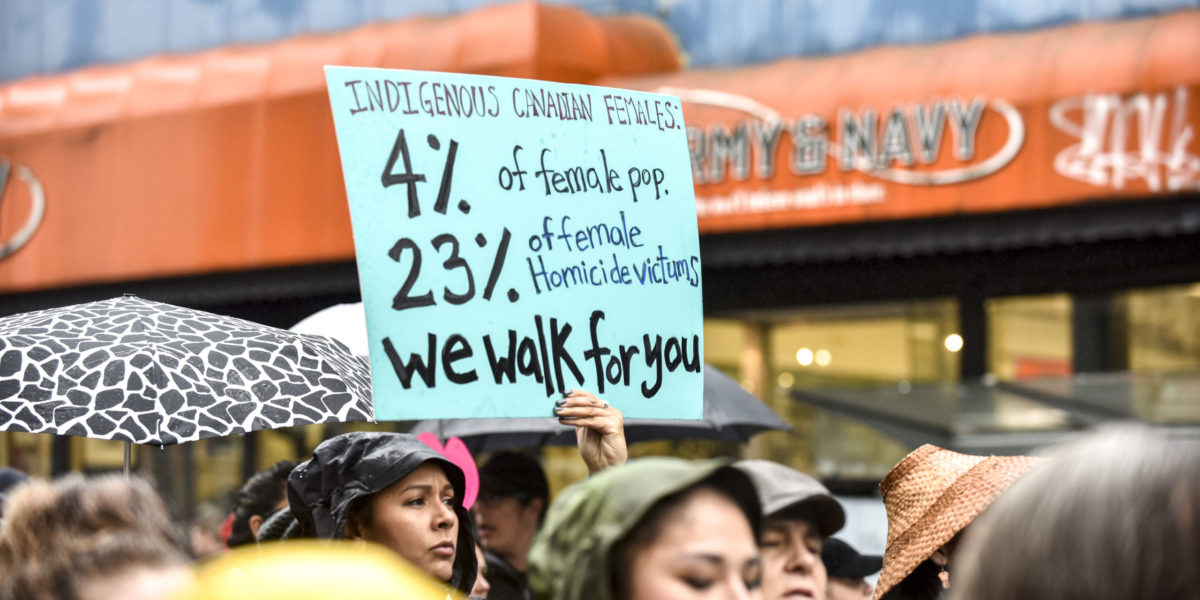A new annual report card is panning the federal government’s failure to implement the goals from their National Action Plan and Federal Pathway to meet the 231 Calls for Justice of the National Inquiry into Missing and Murdered Indigenous Women and Girls (MMIWG).
Canada’s MMIWG2S National Action Plan: Annual Scorecard, which tracked the implementation of actions intended to meet short-term goals while making clear the plan’s next steps, concluded that the vast majority have seen little to no progress since the federal government introduced the plan one year ago.
“Today, we are seeing the sad results of the government’s weak response to the crimes being committed against Indigenous women, girls, and gender-diverse people,” Native Women’s Association of Canada CEO Lynne Groulx said in a Friday release. “The National Action Plan, as it was drafted, was actually a recipe for inaction, and the people represented by our organization are paying the price.”
Highlighting the fact that the federal government’s National Action Plan has few specifics when it comes to funding, timelines, or measurable goals, the scorecard pointed out that just one year ago, the feds committed to allocating $2.2 billion over five years to stop violence against Indigenous women and girls. Unfortunately, they added, “it is unclear how much has actually been spent, where it has been directed, and how much has been accomplished.”
As the Friday release from Native Women’s Association of Canada stated, the organization dismissed the National Action Plan from the beginning, referring to the plan as “an aspirational document with no funding, timelines, or measurable goals.”
Instead, they released an action plan of their own, titled Our Calls, Our Actions. According to the organization, 40 of its 66 action steps have been fully completed, with progress being made on an additional 18.
“These are things that we have implemented because we simply cannot stand by and do nothing while our mothers, daughters, sisters and aunties are being taken from us,” Groulx added. “We fully understand the urgency, even if those who are in power do not.”
New poll shows majority of Canadians support government action on Inquiry recommendations
The scorecard is accompanied by new analysis from the Native Women’s Association of Canada on the progress in meeting the commitments of its own year-old Our Calls, Our Actions plan. A survey commissioned by the Native Women’s Association of Canada and conducted by Nanos Research was also published on Friday, which also marked the one-year anniversary of the federal government’s publication of a National Action Plan to address the Inquiry’s calls for justice.
According to the survey, 41 per cent of respondents believe the government has done little to end the continuing trends of MMIWG, compared to just 12 per cent who were satisfied with the government’s performance. While 33 per cent said it was average, 14 per cent were unsure.
When it comes to the federal government preventing future violence against Indigenous women, girls, and gender-diverse people, more than one in three respondents rated their performance as poor.
The survey also found that more than seven in 10 Canadians have heard of the 231 Calls for Justice issued by the National Inquiry, with 75 per cent of those people noting they have average, or better than average, knowledge of the issues surrounding missing and murdered Indigenous women and girls.
Resoundingly, 95 per cent of respondents agreed it is important, or somewhat important, for the federal government to be transparent in its spending to address the Calls for Action in the MMIWG Inquiry.
Calls for justice legal imperatives, not optional: National Families and Survivors Circle
For the National Family and Survivors Circle (NFSC), which participated in developing the National Action Plan, each and every call for justice is a legal imperative, noting “they are not optional.”
“The cost of inaction is human lives,” the organization noted in a Friday news release. “Indigenous peoples are frustrated by rhetoric and empty promises made by those with responsibility to act.”
As part of their work on the Plan, the NFSC called for both accountability and recourse mechanisms “which focus on Indigenous human rights and inherent, Treaty, and Constitutional rights.”
Additionally, the organization is urging the federal government to introduce clear timelines, meet measurable outcomes, and ultimately, take meaningful action to address as many of the 231 calls for justice as possible.
As the Scorecard reads, “The overwhelming lack of information and transparency makes it difficult to assess progress on the implementation of the Calls for Justice with any certainty.”
Among the many failures documented within the 45-page report was the fact that Minister of Crown and Indigenous Relations and Northern Affairs Marc Miller made no mention of the government’s response to the MMIWG inquiry in a report documenting his progress in his first 100 days in the role. Making matters worse, the organization noted they had to request that a response to the inquiry be put on the agenda at a recent Women and Gender Equality meeting with federal, provincial, and territorial governments.
To make the Plan as effective as possible, the NFSC believes an Accountability Framework, in the form of an independent oversight body, is necessary to hold governments and other institutions accountable for decolonization and ending the ongoing genocide of Indigenous people.
The NWAC previously worked with the federal government on their MMIWG National Action Plan, but walked away days before its release, calling the process “fundamentally flawed” and “politically motivated.”
“We could no longer be part of a process that was so toxic and dysfunctional,” NWAC President and committee representative Lorraine Whitman said in a June 2021 statement, noting that the process exposed her to both “lateral violence and hostility.”



